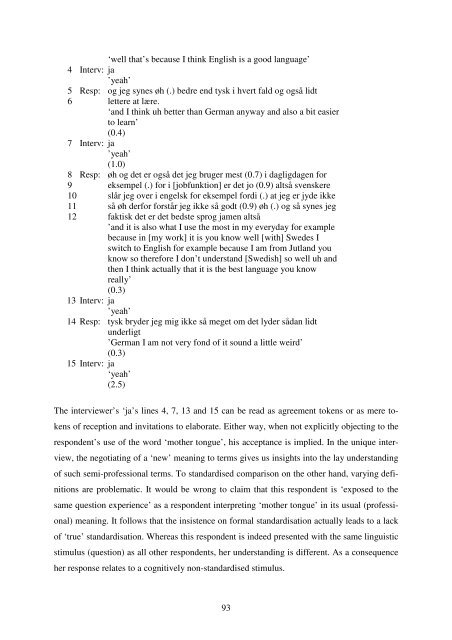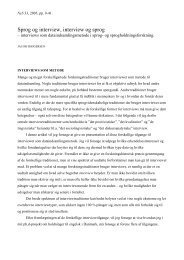Hør dog hvad de siger - Note-to-Self: Trials & Errors
Hør dog hvad de siger - Note-to-Self: Trials & Errors
Hør dog hvad de siger - Note-to-Self: Trials & Errors
You also want an ePaper? Increase the reach of your titles
YUMPU automatically turns print PDFs into web optimized ePapers that Google loves.
‘well that’s because I think English is a good language’<br />
4 Interv: ja<br />
’yeah’<br />
5 Resp: og jeg synes øh (.) bedre end tysk i hvert fald og også lidt<br />
6 lettere at lære.<br />
‘and I think uh better than German anyway and also a bit easier<br />
<strong>to</strong> learn’<br />
(0.4)<br />
7 Interv: ja<br />
’yeah’<br />
(1.0)<br />
8 Resp: øh og <strong>de</strong>t er også <strong>de</strong>t jeg bruger mest (0.7) i dagligdagen for<br />
9 eksempel (.) for i [jobfunktion] er <strong>de</strong>t jo (0.9) altså svenskere<br />
10 slår jeg over i engelsk for eksempel fordi (.) at jeg er jy<strong>de</strong> ikke<br />
11 så øh <strong>de</strong>rfor forstår jeg ikke så godt (0.9) øh (.) og så synes jeg<br />
12 faktisk <strong>de</strong>t er <strong>de</strong>t bedste sprog jamen altså<br />
’and it is also what I use the most in my everyday for example<br />
because in [my work] it is you know well [with] Swe<strong>de</strong>s I<br />
switch <strong>to</strong> English for example because I am from Jutland you<br />
know so therefore I don’t un<strong>de</strong>rstand [Swedish] so well uh and<br />
then I think actually that it is the best language you know<br />
really’<br />
(0.3)<br />
13 Interv: ja<br />
’yeah’<br />
14 Resp: tysk bry<strong>de</strong>r jeg mig ikke så meget om <strong>de</strong>t ly<strong>de</strong>r sådan lidt<br />
un<strong>de</strong>rligt<br />
’German I am not very fond of it sound a little weird’<br />
(0.3)<br />
15 Interv: ja<br />
‘yeah’<br />
(2.5)<br />
The interviewer’s ‘ja’s lines 4, 7, 13 and 15 can be read as agreement <strong>to</strong>kens or as mere <strong>to</strong>-<br />
kens of reception and invitations <strong>to</strong> elaborate. Either way, when not explicitly objecting <strong>to</strong> the<br />
respon<strong>de</strong>nt’s use of the word ‘mother <strong>to</strong>ngue’, his acceptance is implied. In the unique inter-<br />
view, the negotiating of a ‘new’ meaning <strong>to</strong> terms gives us insights in<strong>to</strong> the lay un<strong>de</strong>rstanding<br />
of such semi-professional terms. To standardised comparison on the other hand, varying <strong>de</strong>fi-<br />
nitions are problematic. It would be wrong <strong>to</strong> claim that this respon<strong>de</strong>nt is ‘exposed <strong>to</strong> the<br />
same question experience’ as a respon<strong>de</strong>nt interpreting ‘mother <strong>to</strong>ngue’ in its usual (professi-<br />
onal) meaning. It follows that the insistence on formal standardisation actually leads <strong>to</strong> a lack<br />
of ‘true’ standardisation. Whereas this respon<strong>de</strong>nt is in<strong>de</strong>ed presented with the same linguistic<br />
stimulus (question) as all other respon<strong>de</strong>nts, her un<strong>de</strong>rstanding is different. As a consequence<br />
her response relates <strong>to</strong> a cognitively non-standardised stimulus.<br />
93



